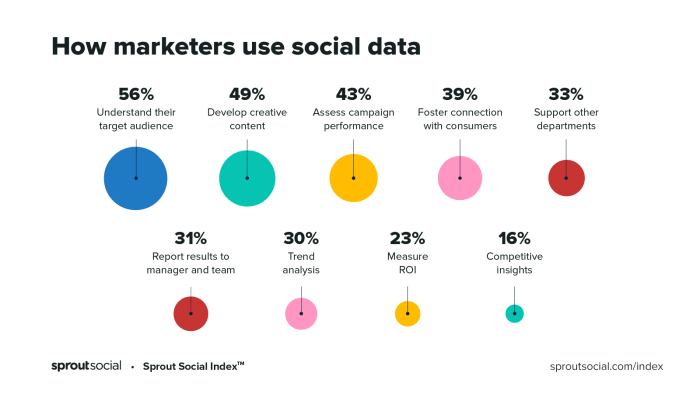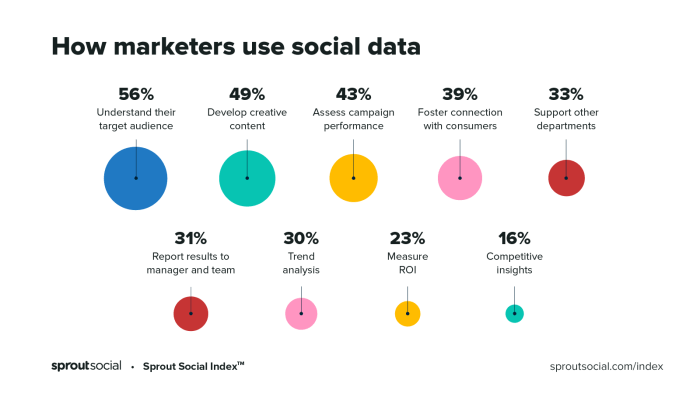Using Social Media Analytics for Strategy sets the stage for leveraging data-driven decisions in today’s digital landscape, where understanding audience behavior and identifying trends are key components for success.
From defining social media analytics to exploring its implementation and competitive advantages, this comprehensive guide delves into the realm of strategic decision-making through data analysis.
Understanding Social Media Analytics
Social media analytics refers to the process of collecting, measuring, and analyzing data from social media platforms to gain insights and make informed decisions. It involves tracking various metrics to assess the performance of social media efforts and understand audience behavior.
Importance of Social Media Analytics
Social media analytics plays a crucial role in developing effective strategies for businesses and organizations. By analyzing data such as engagement rates, reach, and audience demographics, companies can tailor their content and campaigns to better resonate with their target audience. This leads to improved brand awareness, customer engagement, and ultimately, business growth.
Key Metrics in Social Media Analytics
- Engagement Rate: Measures the level of interaction (likes, comments, shares) with social media content.
- Reach: Indicates the number of unique users who have seen a post or ad.
- Impressions: Represents the total number of times a post has been displayed.
- Click-Through Rate (CTR): Tracks the percentage of users who click on a link after seeing it.
Insights into Audience Behavior, Using Social Media Analytics for Strategy
Social media analytics can provide valuable insights into audience behavior by analyzing metrics such as the time of day when users are most active, the type of content that resonates with them, and the devices they use to access social media. This information allows businesses to optimize their content strategy and delivery to enhance audience engagement and conversion rates.
Tools for Social Media Analytics: Using Social Media Analytics For Strategy

In the world of social media, having the right tools for analytics is crucial for understanding your audience and improving your strategy.
Popular Tools for Social Media Analytics
- Hootsuite: Allows you to monitor multiple social media accounts in one place and provides detailed analytics reports.
- Sprout Social: Offers in-depth analytics, social listening, and publishing tools for a comprehensive social media strategy.
- Buffer: Known for its scheduling capabilities, Buffer also provides basic analytics to track engagement and reach.
Comparison of Different Social Media Analytics Tools
| Tool | Features |
|---|---|
| Hootsuite | Multi-account monitoring, detailed analytics reports |
| Sprout Social | In-depth analytics, social listening, publishing tools |
| Buffer | Scheduling capabilities, basic analytics |
Utilization of Facebook Insights and Google Analytics for Social Media Analysis
Both Facebook Insights and Google Analytics offer valuable insights for social media analysis:
Facebook Insights provides data on audience demographics, reach, engagement, and post performance on your Facebook page. Google Analytics tracks website traffic from social media, referral traffic, and conversions.
Benefits of Using Specialized Social Media Analytics Tools
- More detailed insights: Specialized tools provide in-depth analytics that can help you understand your audience better.
- Improved strategy: By analyzing data from these tools, you can tailor your social media strategy for better results.
- Time-saving: Having all analytics in one place saves time and allows for more efficient analysis.
Implementing Social Media Analytics for Strategy
Implementing social media analytics for strategy development involves several key steps to ensure effective decision-making and planning based on data-driven insights. Businesses can leverage social media analytics to inform their strategies and optimize their online presence. Let’s dive into the process and explore successful examples, trends, opportunities, and challenges.
Steps in Implementing Social Media Analytics for Strategy
- Define Objectives: Clearly Artikel the goals and objectives you want to achieve through social media analytics, such as increasing brand awareness, improving customer engagement, or driving sales.
- Choose the Right Tools: Select appropriate social media analytics tools that align with your objectives and provide the necessary data insights for decision-making.
- Collect Data: Gather relevant data from social media platforms, website analytics, and other sources to analyze user behavior, trends, and performance metrics.
- Analyze Data: Utilize data analysis techniques to identify patterns, trends, and key performance indicators (KPIs) that can drive strategic decisions and actions.
- Implement Strategies: Develop and implement strategies based on the insights gained from social media analytics to optimize content, campaigns, and engagement tactics.
- Monitor and Adjust: Continuously monitor the performance of your strategies, analyze results, and make adjustments as needed to improve outcomes and achieve objectives.
Examples of Successful Implementation
- A retail company used social media analytics to identify customer preferences and behavior, leading to personalized marketing campaigns and increased sales.
- An e-commerce business leveraged social media analytics to track competitor activities, optimize pricing strategies, and improve customer retention.
Identifying Trends and Opportunities
- Social media analytics can help businesses identify emerging trends, consumer sentiment, and market opportunities to stay ahead of the competition and align strategies with current market demands.
- By analyzing data on customer interactions, engagement levels, and content performance, organizations can uncover valuable insights that inform product development, marketing initiatives, and customer service improvements.
Challenges in Implementing Social Media Analytics
- Ensuring Data Accuracy: Organizations may face challenges in ensuring the accuracy and reliability of data collected from multiple sources, leading to potential discrepancies in analysis and decision-making.
- Interpreting Complex Data: Analyzing large volumes of data and interpreting complex metrics can be overwhelming, requiring specialized skills and expertise to derive meaningful insights for strategy development.
- Privacy and Compliance: Adhering to data privacy regulations, protecting customer information, and maintaining compliance with industry standards pose challenges for organizations using social media analytics for strategy.
Leveraging Social Media Analytics for Competitive Advantage

In today’s fast-paced business environment, gaining a competitive edge is crucial for sustained success. Leveraging social media analytics can provide companies with valuable insights to stay ahead of the competition.
Social media analytics play a key role in benchmarking against competitors, allowing businesses to track and analyze their performance in comparison to industry rivals. By monitoring metrics such as engagement rates, follower growth, and sentiment analysis, organizations can identify areas of strength and weakness relative to competitors.
Examples of Effective Use of Social Media Analytics
- Company A utilized social media analytics to identify trending topics in their industry and tailor their content strategy accordingly, resulting in increased brand visibility and engagement.
- Company B monitored competitor social media campaigns using analytics tools to uncover gaps in the market and capitalize on opportunities for product innovation.
- Company C implemented real-time data analysis through social media analytics to adjust their marketing tactics on the fly, leading to improved customer targeting and conversion rates.
Impact of Real-Time Data Analysis
Real-time data analysis through social media analytics can have a profound impact on decision-making processes within an organization. By accessing up-to-the-minute insights on consumer behavior, market trends, and competitor activities, businesses can make informed and strategic decisions quickly.
